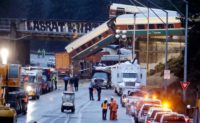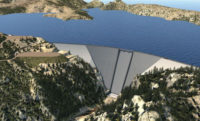A BNSF coal train derailed on a bridge spanning Interstate 25 north of Pueblo, Colo., on the afternoon of Oct. 15. The bridge subsequently collapsed onto the roadway, killing a truck driver and necessitating the highway’s closure.
Early information from the National Transportation Safety Board (NTSB) found that a broken rail led to the train’s derailment, and the derailment in turn caused the bridge to partially collapse onto the interstate.
I-25 remains closed in both directions just north of Pueblo at mile marker 107 with numerous train cars and capsized loads of coal scattered on both the northbound and southbound lanes. Southbound lanes are scheduled to reopen during the afternoon of Oct. 18; northbound lanes will remain closed until crews are able to make further assessments and give more specific updates. Local and regional traffic is being rerouted.
According to a Colorado Department of Transportation (CDOT) press release, BNSF and CDOT officials have already started discussing how to make “necessary repairs to the roadway” as soon as NTSB gives clearance.
Cleanup began on Oct. 16. The timeline of repairs will be made publicly available when the involved entities determine the schedule. The NTSB’s preliminary report on the derailment will be available in mid-November, followed by a final report in 12 to 24 months.
“Investigators will continue to determine the cause of the broken rail and why warning systems did not alert the crews to the condition of the track as part of the ongoing investigation,” the NTSB said in a statement to media.
Yanling Leng, a lead bridge engineer with IMEG Corp. in Sioux Falls, S.D., pointed to the bridge being built in 1958 as a more likely cause for the bridge’s failure than a construction defect. “The primary factors contributing to the issue were likely the rail’s aging and deterioration,” Leng said. “Preventing such accidents necessitates diligent inspections and prompt maintenance and repairs, with no connection to the initial construction.”





Post a comment to this article
Report Abusive Comment